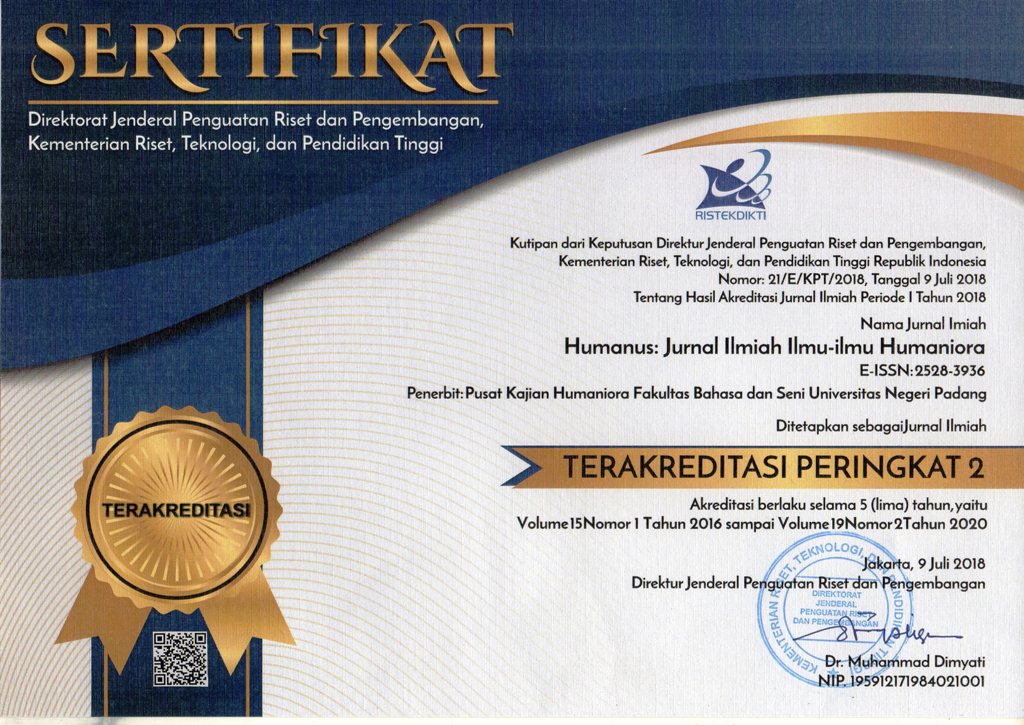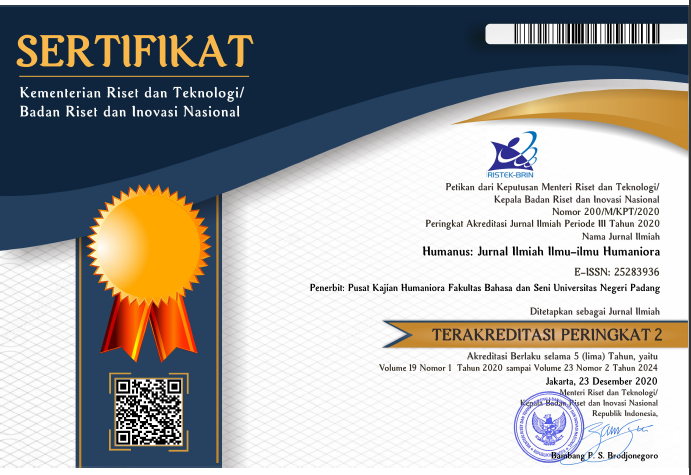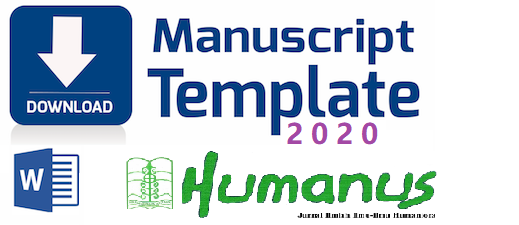Editorial Policies
Focus and Scope
The journal of Humanus welcomes submissions that provide insights into current and key issues dealing with humanities and cultural studies. The journal provides a venue for humanities researchers and practitioners to discuss, pursue and promote knowledge in emerging and developing areas in humanities studies. The language of the manuscript must be in English. There must be critical discussion of issues and new and significant contribution to the related to the humanities include the study of all languages and literatures, the arts, history, and philosophy. Articles can be from any of the following areas:
- linguistics covers the study of the form, functionality, development and evolution of language as used by humans, including discourse analysis, translation studies, forensic linguistics, and other linguistic related studies.
- literature: the study of written works of the imagination, of which poetry, drama and narrative fiction constitute today the most familiar types or genres
- history cover chronologically various themes, such as local history, social history, cultural history, economic history, political history, military history, intellectual history, environmental history, and other historical studies.
- cultural studies cover interdisciplinary field, drawing on theories and practices from a range of humanities and social sciences disciplines, that seeks to investigate the ways in which cultures produce and are produced.
Section Policies
Articles
 Open Submissions
Open Submissions Indexed
Indexed Peer Reviewed
Peer Reviewed
Editorial
Editors- Dr. M. Arianto, M.Pd
- Yenni Hayati
- Tressyalina, S.Pd., M.Pd.
 Open Submissions
Open Submissions Indexed
Indexed Peer Reviewed
Peer Reviewed
Peer Review Process
Humanus: Jurnal Ilmiah Ilmu-ilmu Humaniora is a double-blind peer-reviewed journal. Every paper submitted to the Humanus: Jurnal Ilmiah Ilmu-ilmu Humaniora for publication is subject to peer review. The peer review in this journal is an evaluation of the submitted paper by two or more individuals of similar competence to the author. It aims to determine the academic paper's suitability for publication. The peer review method is double-blind employed to maintain standards of quality and provide credibility of the papers. The peer review at Humanus: Jurnal Ilmiah Ilmu-ilmu Humaniora proceeds in 9 steps with the description as follows.
1. Submission of Paper
The corresponding or submitting author submits the paper to the journal. This is carried out via an online system supported by the Open Journal System (OJS) or website of Humanus: Jurnal Ilmiah Ilmu-ilmu Humaniora.
2. Editorial Office Assessment
The submitted paper is first assessed by the Humanus' editor. The editor checks whether it is suitable with the Journal focus and scope. The paper's composition and arrangement are evaluated against the journal's Author Guidelines to make sure it includes the required sections and stylizations. In addition, an assessment of the minimum required quality of the paper for publication begins at this step, including one that assesses whether there is a major methodological flaw. Every submitted paper which passes this step will be checked by Turnitin to measure the similarity index which leads to plagiarism before being reviewed by reviewers.
3. Appraisal by the Editor-in-Chief
The Editor-in-Chief checks if the paper is appropriate for the journal, sufficiently original, interesting, and significant for publication. If not, the paper may be rejected without being reviewed any further.
4. Invitation to Reviewers
The handling editor sends invitations to individuals who he or she believes would be an appropriate reviewer (also known as referees) based on expertise, the closeness of research interest, and no conflict of interest consideration. The peer review process at Humanus: Jurnal Ilmiah Ilmu-ilmu Humaniora involves a community of experts in the humaties who are qualified and able to perform reasonably impartial review. The impartiality is also maintained by the double-blind peer review employed in this journal. That said, the reviewer does not know the author's identity, conversely, the author does not know the reviewer's identity. The paper is sent to reviewers anonymously.
5. Response to Invitations
Potential reviewers consider the invitation against their own expertise, conflicts of interest, and availability. They then decide to accept or decline. In the invitation letter, the editor may ask the potential reviewer for the suggestion of an alternative reviewer, when he or she declines to review.
6. Review is Conducted
The reviewers allocate time to read the paper several times. The first read is used to form an initial impression of the work. If major problems are found at this stage, the reviewers may feel comfortable rejecting the paper without further work. Otherwise, they will read the paper several more times, taking notes so as to build a detailed point-by-point review. The review is then submitted to the journal, with a recommendation to accept, or reject it, or else with a request for revision (usually flagged as either major or minor) before it is reconsidered.
7. Journal Evaluates the Reviews
The Editor-in-Chief and managing editor consider all the returned reviews before making an overall decision. If the reviews differ widely between both reviewers, the managing editor may invite an additional reviewer so as to obtain an extra opinion before making a decision.
8. The Decision is Communicated
The editor sends a decision email to the author including any relevant reviewer comments. Reviewer comments is sent anonymously to the corresponding author to take the necessary actions and responses. At this point, reviewers are also be sent an email or letter letting them know the outcome of their review.
9. Final Steps
If accepted, the paper is sent to copy-editing. Suppose the article is rejected or sent back to the author for either major or minor revision. In that case, the handling editor will include constructive comments from the reviewers to help the author improve the article. The author should make corrections and revise the paper per the reviewers' comments and instructions.
After revision has been made, the author should resubmit the revised paper to the editor.
If the paper was sent back for revision, the reviewers should expect to receive the revised version, unless they have opted out of further participation. However, where only minor changes were requested this follow-up review might be done by the handling editor.
If the editor is happy with the revised paper, it is considered to be accepted. The accepted papers will be published online and all are freely available as downloadable pdf files.
Publication Frequency
Humanus: Jurnal Ilmiah Ilmu-ilmu Humaniora published scientific articles in humanities studies twice a year, i.e. March and October.
Open Access Policy
This journal provides immediate open access to its content on the principle that making research freely available to the public supports a greater global exchange of knowledge.
Archiving
This journal utilizes the LOCKSS system to create a distributed archiving system among participating libraries and permits those libraries to create permanent archives of the journal for purposes of preservation and restoration. More...
Accreditation Decre of Humanus
Humanus: Jurnal Ilmiah Ilmu-ilmu Humaniora is Nationally Accredited in SINTA 2.
Periode 2020-2024
2016-2020
Accreditation Number (Ministry of RTHE): 21/E/KPT/2018, date July 9, 2018.
Valid thru: Vol. 15 No. 1, 2016 - Vol. 19 No. 2, 2020.

Publication Ethics
HUMANUS: Jurnal Ilmiah Ilmu-ilmu Humaniora is dedicated to following best practices on ethical matters, errors and retractions. The prevention of publication malpractice is one of the important responsibilities of the editorial board. Any kind of unethical behavior is not acceptable, and Humanus does not tolerate plagiarism in any form. Authors submitting articles to Humanus affirm that manuscript contents are original.
In order to achieve best practice, Humanus: Jurnal Ilmiah Ilmu-ilmu Humaniora follows the COPE Code of Conduct and Best Practice Guidelines for Journal Editors and the Code of Conduct for Journal Publishers.
The following duties outlined for editors, authors, and reviewers are based on the Committee of Publication Ethics (COPE) and covers Code of Conduct for Authors, Reviewers, Editors. Editor In Chief & Managing Editors, Editorial Boards and Publisher will also adhere to the Humanus submission guideline policies.
Duties of the Authors
- Authors should present an accurate account of their original research as well as an objective discussion of its significance. Manuscripts will follow the submission guidelines of the journal. (See submission guideline policies)
- Have the responsibility of ensuring only new and original work is submitted.
- Authors must not submit the same manuscript to more than one journal concurrently. It is also expected that the author will not publish redundant manuscripts or manuscripts describing the same research in more than one journal.
- Must not submit any articles that are being reviewed or considered by the Humanus journal to other journals simultaneously.
- Authors should acknowledge all sources of data used in the research and cite publications that have been influential in the research work.
- Authorship should be limited to those who have made a significant contribution to conception, design, execution or interpretation of the reported study. Others who have made significant contribution must be listed as co-authors. Authors also ensure that all the authors have seen and agreed to the submitted version of the manuscript and their inclusion of names as co-authors.
- Authors should provide raw data related to their manuscript for editorial review and must retain such data.
- If at any point of time, the author(s) discovers a significant error or inaccuracy in submitted manuscript, then the error or inaccuracy must be reported to the editor.
- Are only allowed to publish their work elsewhere after receiving a formal rejection from the journal or if their request to withdraw their work is officially accepted by the journal.
- Should make significant contributions and be held accountable for any shortcoming in their work.
Duties of the Reviewers
- Information regarding manuscripts submitted by authors should be kept confidential and be treated as privileged information.
- Can refuse to review any submission due to a conflict of interest or inadequate knowledge.
- Manuscript reviewers must ensure that authors have acknowledged all sources of data used in the research. Any kind of ethical misconduct, similarity, or overlap between the manuscripts under consideration or with any other published paper of which reviewer has personal knowledge must be immediately brought to the editor's notice.
- Review of submitted manuscripts must be done objectively, fairly, and the reviewers should express their views clearly and professionally with supporting arguments.
- Must disclose any competing interest before agreeing to review a submission.
- In the event that a reviewer feels it is not possible for him/her to complete review of manuscript within stipulated time then this information must be communicated to the editor, so that the manuscript could be sent to another reviewer.
- Should ensure the originality of a submission and be alert to any plagiarism and redundant publication.
- Must not discuss the content of the submission without permission.
- Adhere to the time allocated for the review process. Requests for extension to review the submission is at the discretion of the Editor-in-Chief.
Duties of the Editors
- Based on the review report of the editorial review board, the editor can accept, reject, or request modifications to the manuscript.
- Each editor must ensure that each manuscript is initially evaluated by the editor for originality, making use of appropriate software to do so. Following desk review, the manuscript is forwarded blind peer review to the editorial review board who will make a recommendation to accept, reject, or modify the manuscript.
- The editor must ensure that each manuscript received by Humanus: Jurnal Ilmiah Ilmiah Ilmu-ilmu Humaniora is reviewed for its intellectual content without regard to sex, gender, race, religion, citizenship, etc. of the authors.
- The editor must ensure that information regarding manuscripts submitted by the authors is kept confidential.
- The editor will not use unpublished materials disclosed in a submitted manuscript for his/her own research without written consent of the author.
Duties of the Editorial Board Members
- Actively contribute to the development and the greater good of the journal.
- Act as ambassadors for the journal.
- Continuously support and promote the journal.
- Review any work assigned to them.
Duties of the Editor-in-Chief & Managing Editors
- Evaluate manuscripts fairly and solely on their intellectual merit.
- Ensure confidentiality of manuscripts and not disclose any information regarding manuscripts to anyone other than the people involved in the publishing process.
- Has the responsibility to decide when and which articles are to be published.
- Actively seek the views of board members, reviewers and authors on how to improve/ increase the image and visibility of the journal.
- Give clear instructions to potential contributors on the submission process and what is expected of the authors.
- Ensure appropriate reviewers are selected/ identified for the reviewing process.
Duties of the Publisher
Handling of unethical publishing behaviour
In cases of alleged or proven scientific misconduct, fraudulent publication or plagiarism, the publisher, in close collaboration with the editors, will take all appropriate measures to clarify the situation and to amend the article in question. This includes the prompt publication of an erratum, clarification or, in the most severe case, the retraction of the affected work. The publisher, together with the editors, shall take reasonable steps to identify and prevent the publication of papers where research misconduct has occurred, and under no circumstances encourage such misconduct or knowingly allow such misconduct to take place.
Access to journal content
The publisher is committed to the permanent availability and preservation of scholarly research and ensures accessibility by partnering with organizations and maintaining our own digital archive.
Disclaimer
The Editors of Humanus make every effort to ensure the accuracy of all the information (the “Content”) contained in its publications. However, the Editors of Humanus make no representations or warranties whatsoever as to the accuracy, completeness or suitability for any purpose of the Content and disclaim all such representations and warranties whether express or implied to the maximum extent permitted by law. Any views expressed in this publication are the views of the authors and are not necessarily the views of the Editors of Humanus.
Indexing and Abstracting
Humanus: Jurnal Ilmiah Ilmu-ilmu Humaniora, a peer-reviewed online journal in humanities studies published by Center for Humanities Studies FBS Universitas Negeri Padang (previously published by Lembaga Penelitian Universitas Negeri Padang), Indonesia.
ISSN 1410-8062 (printed), ISSN 2528-3936 (Online)
Humanus: Jurnal Ilmiah Ilmu-ilmu Humaniora has been indexed on, among others:
- DOAJ (Directory of Open Access Journal)
- Crossref
- Sinta (Science and Technology Index)
- Dimension
- Google Scholar
- WorldCat
- Bielefeld Academic Search Engine (BASE)
- CORE: Max Planck Institute
- UNSW Library
- Harvard University Library
- University of Leicester
- The University of Hong Kong Libraries
- University of Cambridge
- The University of Oxford
- University of Saskatchewan-Canada
- Gent University Library
- University of Glasgow
- American University Library
- The University of Edinburgh
- Ecole normale supérieure Paris, library
- The University of Manchester
- Vrije Universiteit Brussel
- Vancouver Public Library
- University of Westminster
- Nelson Mandela University
- Midwestern University Library
- Academic Resource Index
- PKP Index: Simon Fraser University
- Mendeley
- Repository Ilmiah Indonesia
- LIVIVO
- Copac JISC
- ROAD: Directory of Open Access Scholarly Resources
- Chulalongkorn University Libraries
- Columbia University Libraries
- Leiden University Libraries
- Boston University Library
- Western Theological Seminary
- The University of Sheffield
- Open Archive











